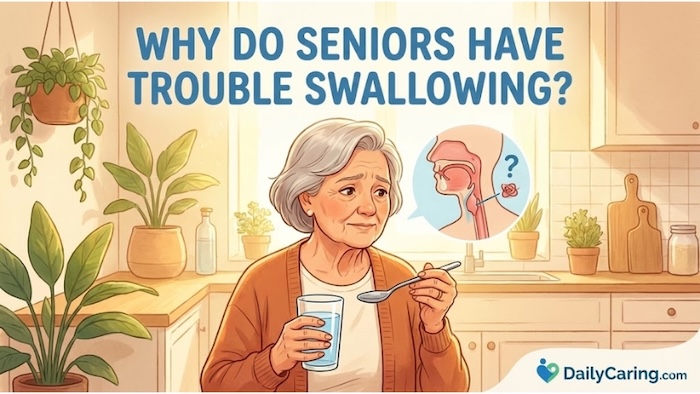For many seniors, a simple sip of water or bite of food can transform from a basic pleasure into a silent, daily struggle fraught with anxiety and risk. Difficulty swallowing, known as dysphagia, is not just a minor inconvenience; it's a serious medical condition affecting millions of older adults, often hidden behind closed doors.
When the muscles and nerves involved in swallowing weaken due to age, stroke, or other conditions, the consequences can be severe: malnutrition, dehydration, and a terrifying risk of choking or aspiration pneumonia. This article lifts the curtain on a common but under-discussed challenge, explaining the “why” behind swallowing difficulties and empowering caregivers and seniors with the knowledge to seek solutions, ensure safety, and reclaim the joy and dignity of eating.

Swallowing Problems are Common in Aging Adults
Some older adults have trouble swallowing food or liquids.
This serious condition is called dysphagia and could cause malnutrition, dehydration, or aspiration pneumonia.
For caregivers, it’s scary to watch someone who’s having trouble swallowing and not be able to help.
We explain what dysphagia is, why it’s so serious, common signs of dysphagia, and what causes it.
What is Dysphagia?
Dysphagia means difficulty swallowing and is pronounced dis-fay-gee-ah (hear the word here).
It can happen at any age, but it is more common in older adults, especially those with acid reflux.
It’s estimated that 15% of seniors and up to 68% of nursing home residents are affected by dysphagia.
Why Should You Be Concerned About Swallowing Problems
Dysphagia is vital to be aware of because it can cause serious health problems for seniors, including:
- Poor nutrition
- Dehydration
- Loss of appetite
- Weight loss
- Not taking medication properly
- Aspiration pneumonia – a lung infection caused by food or liquid particles in the lungs, and the leading cause of hospitalization and death in nursing home residents
VIDEO: Expert Tips on Managing Dysphagia in Aging Adults
Signs and Symptoms of Dysphagia
Having trouble swallowing once in a while, usually because of eating too fast or not chewing well, isn’t the same as showing signs of dysphagia.
But if you’re noticing frequent signs of dysphagia, it’s essential to have your older adult visit their doctor for an examination as soon as possible.
Signs of dysphagia include:
- Coughing while eating or drinking
- Choking on food, liquids, or medication
- A gurgly-sounding voice, especially after eating or drinking
- Difficulty swallowing food or drinks
- Drooling
If you aren’t able to eat meals with your older adult, here are some questions you can ask to find out if they’re having a swallowing problem:
- Do you often cough or choke after eating or drinking?
- Does it sometimes feel like food is going down the “wrong way”?
- Do you often feel like food is stuck in your throat?
- How long does it take you to eat a meal?
- Is eating sometimes less enjoyable than it previously was?
- Have you lost weight recently (without trying)?
What Causes Dysphagia?
Any issue with the swallowing process can cause problems.
There are many potential causes for dysphagia, which is why it’s so important to get checked out by a doctor.
Common causes include:
- Teeth in bad condition or poorly fitting dentures
- Typical aging (weakening of the mouth/throat muscles)
- Acid reflux (GERD)
- Stroke
- Cognitive disorders like Alzheimer’s or dementia
- Cancer of the mouth, throat, or esophagus
- Certain medications
Final Thoughts on Dysphagia in Aging Adults
Understanding the root causes of swallowing difficulties is the critical first step toward effective management and safer mealtimes. While dysphagia presents significant challenges, it is not an inevitable sentence to fear and poor health.
By recognizing the signs early (such as coughing during meals, a “gurgly” voice after eating, or unexplained weight loss), you can take proactive action. Consulting with a doctor and a speech-language pathologist opens the door to personalized strategies, from dietary modifications to targeted exercises, that can dramatically improve quality of life.
You are not powerless in the face of this condition. With knowledge and professional support, you can help your loved one navigate dysphagia with confidence, ensuring they receive the nutrition they need while significantly reducing risk and restoring a sense of comfort to one of life's most essential daily routines.
Recommended for you:
- 4 Ways to Add Healthy Calories to a Dysphagia Diet for Swallowing Problems
- Pneumonia in Seniors: Symptoms, Treatment, and Prevention
- 7 Tips for Helping Seniors at the Doctor: Being a Health Advocate
About the Author

Connie is the founder of DailyCaring.com and was a hands-on caregiver for her grandmother for 20 years. (Grandma made it to 101 years old!) She knows how challenging, overwhelming, and all-consuming caring for an older adult can be. She also understands the importance of support, especially in the form of practical solutions, valuable resources, and self-care tips.














Noel Rosney When i was training to be an assistant healthcare nurse i came across patients with swallowing difficulties when i did my work experience in a nursing home. Some of the patients had to have thickner placed in their drinks, this prevented them from aspirating. The thickners would be given in a small tea spoonful and were like sugar particles. They were graded 1 to 4 according to the patients requirements & they were mixed with the fluids eg soft drink, tea, soup. I know of the importance of patients fluids intake . It is vital that the Carer is very familiar with this procedure as well as the Patients medication needs. Thank you Daily Caring for the tips they are most helpful.
Thanks for sharing your experience and for the kind feedback! We’re so glad this article is helpful.
I always cough when I eat or drink
It’s best to speak with your doctor to find out what might be causing this to happen.
I two had the barium swallow but was told I was in normal range. But I have 100% of the symptoms you listed. Finding new Dr
It’s a good idea to get a second opinion or keep working with your doctor to find the cause of your swallowing issues. It’s possible that there’s a different underlying cause that’s causing these symptoms.
Dysphagia has cute in 82 year old also has dementia
We’re so sorry to hear that. In case it’s helpful, we’ve got an article with additional tips for dysphagia:
— 7 Helpful Tips for Seniors and Caregivers Managing Dysphagia https://dailycaring.com/7-helpful-tips-for-seniors-and-caregivers-managing-dysphagia/
— 4 Easy Ways to Add Healthy Calories to a Dysphagia Diet for Swallowing Problems https://dailycaring.com/4-easy-ways-to-add-healthy-calories-to-a-dysphagia-diet-for-swallowing-problems/
— 10 Quick and Easy Dysphagia Diet Recipes (for Swallowing Problems): 5 Ingredients or Less https://dailycaring.com/10-quick-and-easy-dysphagia-diet-recipes-for-swallowing-problems-5-ingredients-or-less/
I have been choking for about a year even on water. My doctor ordered a barium swallow test. I was diagnosed with a sliding hernia and a Schatzi’s ring in the esophagus. The ring restricts how much can be swallowed. They gave me a pill to swallow and noted in the report that my esophagus was too narrow for the pill to go through.
I am scheduled for have my esophagus stretched and learned that sometimes, it has to be stretched again and again. There is a surgical procedure where the ring is cut in places to open up the area. Ho hum!
We’re so sorry about the condition affecting your ability to eat and drink. But it’s great that you had it properly diagnosed and that the surgery will be able to help. Wishing you the best outcome possible!
Maybe they should be checked for Achalasia. Dilatation should help. I’ve only had it done once. Before surgery have at least three different doctors opinions.
It’s important to have their doctor do a thorough checkup to find the cause of any swallowing problems. Each person’s body and health conditions are unique, so it’s essential to have their own doctor make a proper diagnosis and recommend treatments for their specific situation.